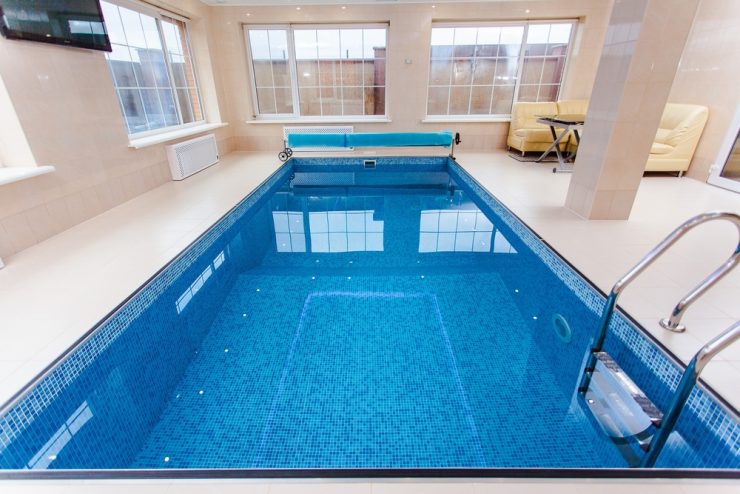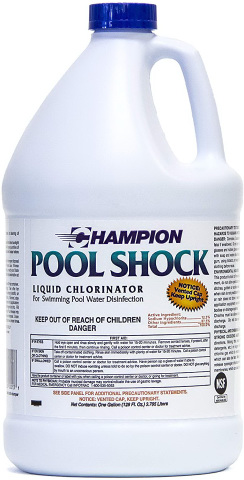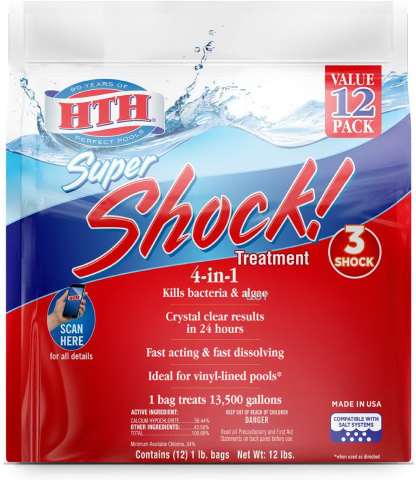If you haven’t owned an indoor pool before and you use chlorine or bromine to sanitize it, you may be wondering if you need stabilizer?
Stabilizer or cyanuric acid is not recommended for indoor pools as it reduces the chlorine’s effectiveness. Stabilizer is also unnecessary for indoor pools as they are not exposed to the sun’s UV rays. For bromine indoor pools, there are no available products which stabilize this chemical.

Article Contents
What is a Pool Stabilizer?
Pool stabilizer or cyanuric acid (CYA), often also called pool conditioner, sunscreen for your pool and chlorine stabilizer, functions to stabilize chlorine and protect it.
When chlorine is exposed to UV light, it degrades and becomes less effective at sanitizing water. In fact, without stabilizer, chlorine can be burned off in as little as a few hours.
When stabilizer is added to the water, it chemically bonds to the chlorine and protects it from the UV light, making it last much longer. In many states, there are laws and regulations requiring swimming pools to maintain a level of stabilizer of 10-70 ppm. But not for indoor pools.
Stabilized chlorine will last longer, be more effective at killing bacteria and will mean you will not need to continuously add it to your outdoor pool.
But what if you use Bromine for your pool and not chlorine?
Do You Need Stabilizer for an Indoor Pool Using Bromine?
Indoor pools using bromine to sanitize them do not require stabilizer. Stabilizers (cyanuric acid) are not effective at protecting bromine and therefore are no use in a bromine treated pool. Stabilizer only benefits chlorinated pools.
But doesn’t bromine degrade in sunlight?
Bromine, just like chlorine, degrades when exposed to sunlight. And with exposure to UV light it becomes ineffective at sanitizing.
Unfortunately there are no stabilizers that work for bromine. It’s for this reason bromine is usually only used to sanitize indoor pools and hot tubs. They are not exposed to the same levels of UV light as an outdoor pool is and therefore will not degrade quickly the way it would in sunlight.
Other Reasons Not to Use Stabilizer in Indoor Pools
The Portage County Health Department in Ohio goes as far as saying that stabilizer should never be used in indoor swimming pools.
When stabilizer is added to a pool, it actually reduces the effectiveness of chlorine. Chlorine when combined with cyanuric acid takes longer to kill off bacteria. Why would you use it then if it makes the chlorine less effective?
That said, the benefits of using cyanuric acid in outdoor pools far outweighs the disadvantage of reduced chlorine effectiveness. Chlorine very quickly losses its sanitizing power outside and without stabilization it would not be practical or cost effective to use in a pool.
It’s not the same for indoor pools though.
Firstly, there is no advantage of adding stabilizer to the water of an indoor pool. In fact, it’s a disadvantage.
Indoor pools are generally maintained at higher temperatures than outdoor pools. And bacteria thrives and multiplies fastest in warm temperatures. This makes indoor pools more prone to unwanted bacteria that can cause sickness. It’s for this reason that the chlorine needs to be as effective as possible.
And without stabilizer added, the chlorine will be at its most effective.
Types of Chlorine That Contain Stabilizer
Now you know that you do not need a stabilizer for your indoor pool. But did you know that some chlorine contains stabilizer?
You see there are two different types of chlorine:
- Stabilized
- Unstabilized
Stabilized Chlorines
Stabilized chlorines are chlorines that have had a stabilizing chemical added to them. Cyanuric acid or CYA for short.
Some of these stabilized chlorine products can contain up to 70% stabilizer in them.
It’s helpful for many pool owners to use a combined chlorine product like this as it is much more convenient to add a single chemical. The alternative is to add chlorine and cyanuric acid separately.
Stabilized chlorine products are very popular but aren’t suitable for indoor pools though.
Stabilized chlorine types include:
- Dichlor
- Trichlor
If you have an indoor swimming pool check the label for the ingredients before buying a chlorine product to ensure it doesn’t have stabilizer added.
Usually the ingredients list for stabilized chlorine products will have words that contain half the alphabet like:
- Dichloro-S-Triazinetrione
- Trichloro-s-triazinetrione
- Trichloroisocyanuric acid
- Dichloroisocyanurate Dihidrate
- Sodium dichloroisocyanurate
You may think you need to be a chemist to know if these contain stabilizer. Luckily you don’t.
All you’re looking for is “dichlor”, “trichlor” or a word that has “cyanur” in it. All of these have cyanuric acid or stabilizer added to them.
Unstabilized Chlorine
Unstabilized Chlorine is chlorine that does not contain a stabilizer additive. It’s usually used for indoor pools, as pool shock or for the outdoor pool owner that wants to raise their pool’s chlorine levels without raising the CYA (stabilizer) levels.
Unstabilized chlorine includes:
- Calcium hypochlorite (commonly sold as pool shock)
- Household bleach like Clorox
- Liquid chlorine (Sodium hypochlorite)
- Lithium hypochlorite
All of these chlorines are not stabilized. And if you own an indoor pool, you should be using unstabilized chlorine like these chlorines listed above or you can use bromine.
When you check the ingredients list for these products you may see other ingredients on the label. As long as you don’t see “dichlor”, “trichlor” or a word that has “cyanur” or “cyanuric” in it the product does not contain stabilizer.
By the way, liquid chlorine (sodium hypochlorite) never contains stabilizer and is perfect for indoor pools.
You can also use a household bleach like Clorox for your indoor pool. But be careful not to use one that contains scents or colors. This is bad for your pool!
Further Reading: Can You Use Bleach or Clorox in a Pool? Is it Cheaper?
Unstabilized Chlorines for Indoor Pools
I have a few recommended Chlorines that do not contain stabilizers you might want to check on. These are the best choice for indoor swimming pools.
Unstabilized Liquid Chlorine 12.5% Strength
Although this product says “Pool Shock”, it is just the marketing. This liquid chlorine is the standard pool industry strength and is perfect for indoor pools.

Click here to check the price >>
HTH 52026 Super Shock (Unstabilized Calcium Hypochlorite)
Again although this product is labelled as “Shock”, it is just the marketing. This product is calcium hypochlorite, which is an unstabilized chlorine, perfect for indoor pools.

Click here to check the price >>
Final thoughts
In conclusion, for an indoor pool, an unstabilized Chlorine like liquid chlorine or calcium hypochlorite is advisable as stabilizer is only needed if the pool is exposed to UV light.
Related Reading:
Which Chlorine to Use for Inground Pools?
Hot Tub Cyanuric Acid (Stabilizer) High | How to Lower

